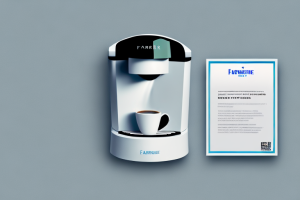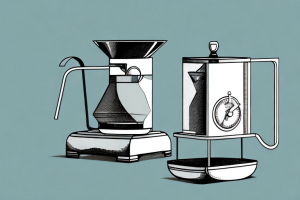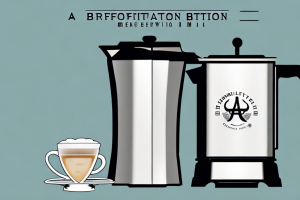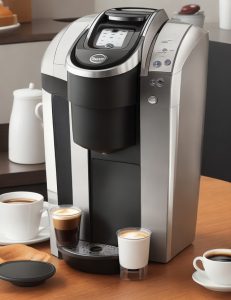Coffee Maker Watt

A coffee maker with a wattage meter attached
If you’re someone who loves their morning cup of joe, then you know how important it is to have a reliable coffee maker at home or in your office. There are many factors to consider when choosing a coffee maker that suits your needs, including wattage. In this comprehensive guide, we’ll be discussing everything there is to know about coffee maker wattage to help you make an informed decision when purchasing your next coffee maker.
What is a coffee maker watt?
Wattage is a measure of the power needed to operate an electrical device. In the case of coffee makers, wattage refers to the amount of energy required to heat the water used in the brewing process.
The wattage of a coffee maker can vary depending on the size and type of the machine. For example, a small single-serve coffee maker may only require 600 watts, while a larger drip coffee maker may require 1200 watts or more. It’s important to consider the wattage when purchasing a coffee maker, as a higher wattage machine may be able to brew coffee faster and more efficiently, but may also use more energy and cost more to operate.
Understanding the importance of wattage in coffee makers
Wattage is an important factor to consider when choosing a coffee maker because it determines the speed at which your coffee will be brewed. A coffee maker with higher wattage will heat the water faster and therefore brew your coffee quicker. However, high wattage coffee makers may consume more electricity and cost more to operate.
Another important consideration when it comes to wattage is the size of the coffee maker. A larger coffee maker with a higher wattage may be necessary if you are brewing coffee for a large group of people. On the other hand, if you only need to brew a single cup of coffee at a time, a lower wattage coffee maker may be more suitable.
It’s also worth noting that wattage is not the only factor that affects the brewing speed of a coffee maker. Other factors such as the type of coffee maker, the brewing method, and the quality of the coffee grounds can also impact the brewing time and the overall taste of your coffee.
How many watts does a typical coffee maker use?
A typical coffee maker uses between 600 and 1500 watts of power. However, some high-end models can use up to 2000 watts.
It is important to note that the wattage of a coffee maker can affect your electricity bill. If you use your coffee maker every day, opting for a model with a lower wattage can save you money in the long run. Additionally, some coffee makers have energy-saving features, such as automatic shut-off, which can also help reduce your energy consumption.
Another factor that can affect the wattage of your coffee maker is the size of the machine. Larger coffee makers, such as those used in commercial settings, can use significantly more power than a standard home coffee maker. It is important to consider your specific needs and usage when selecting a coffee maker to ensure that you are getting the most efficient and cost-effective option for your situation.
Top coffee makers with high wattage for faster brewing time
For coffee lovers who want their morning coffee to be ready quickly, a high-wattage coffee maker is a great choice. The Breville BDC450 Precision Brewer and the Technivorm Moccamaster are both great options that use 1650 watts and 1475 watts respectively. These coffee makers can brew a full pot of coffee in a matter of minutes, ensuring you’re never late for work because of a slow coffee maker.
It’s important to note that while high-wattage coffee makers can brew coffee faster, they also consume more energy. If you’re looking for an eco-friendly option, consider a coffee maker with a lower wattage or one that has an automatic shut-off feature to conserve energy. Additionally, some high-wattage coffee makers may produce a stronger and more bitter taste due to the faster brewing process, so it’s important to read reviews and do your research before making a purchase.
Low-wattage coffee makers for energy efficiency and cost savings
If energy efficiency and cost savings are important to you, then a low-wattage coffee maker is the way to go. Low-wattage coffee makers can use as little as 300 watts of power, making them much more energy-efficient than their high-wattage counterparts. The Cuisinart DCC-450BK 4-Cup Coffeemaker is a great low-wattage option that uses only 600 watts of power while still brewing a great cup of coffee.
Not only do low-wattage coffee makers save on energy costs, but they also have a smaller environmental impact. By using less energy, they reduce the amount of greenhouse gas emissions produced by power plants. Additionally, many low-wattage coffee makers are designed with eco-friendly materials and features, such as reusable filters and automatic shut-off functions.
Another benefit of low-wattage coffee makers is their portability. Many models are compact and lightweight, making them ideal for travel or small living spaces. Some even come with a car adapter, allowing you to brew coffee on the go. So, whether you’re camping in the wilderness or living in a tiny apartment, a low-wattage coffee maker can provide you with a hot cup of coffee without taking up too much space or energy.
Factors that affect the wattage of a coffee maker
There are a few factors that can affect the wattage of a coffee maker, including the size of the machine, the type of heating element used, and the brewing temperature.
The size of the coffee maker can have a significant impact on its wattage. Larger machines typically require more power to heat up and maintain the brewing temperature. This is because they have a larger volume of water to heat and keep warm. As a result, a larger coffee maker will generally have a higher wattage than a smaller one.
The type of heating element used in a coffee maker can also affect its wattage. Some coffee makers use a traditional heating plate to keep the coffee warm, while others use a more energy-efficient thermal carafe. Coffee makers with a heating plate tend to have a higher wattage, as they need to maintain a consistent temperature to keep the coffee warm. In contrast, coffee makers with a thermal carafe require less power, as the insulated carafe keeps the coffee warm without the need for a heating element.
The relationship between wattage and brewing temperature in coffee makers
The wattage of a coffee maker is closely related to the temperature of the water used in the brewing process. Higher wattage coffee makers can heat the water to a higher temperature, which can affect the taste of the coffee. If you prefer your coffee to be brewed at a specific temperature, it’s important to choose a coffee maker with the appropriate wattage to achieve that temperature.
However, it’s important to note that higher wattage coffee makers may also have a shorter lifespan due to the increased strain on the heating element. Additionally, using a coffee maker with a wattage that is too high for your needs can result in wasted energy and higher electricity bills.
Another factor to consider is the type of coffee beans being used. Different types of beans require different brewing temperatures to achieve their optimal flavor. For example, lighter roasts typically require a higher brewing temperature than darker roasts. It’s important to research the optimal brewing temperature for the specific type of coffee beans you are using and choose a coffee maker with a wattage that can achieve that temperature.
How to choose the right wattage for your home or office coffee maker
Choosing the right wattage for your coffee maker depends on your specific needs and preferences. If you’re someone who is always on-the-go and needs their coffee as quickly as possible, then a high-wattage coffee maker might be the way to go. If energy efficiency and cost savings are important to you, then a low-wattage coffee maker is the way to go. Take some time to consider your needs before making a decision.
Another factor to consider when choosing the right wattage for your coffee maker is the size of your household or office. If you’re the only coffee drinker in your household or office, then a low-wattage coffee maker might be sufficient. However, if you have multiple coffee drinkers or entertain guests frequently, then a high-wattage coffee maker might be necessary to keep up with the demand. Additionally, if you plan on using your coffee maker for other purposes, such as making tea or hot chocolate, then a higher wattage might be more versatile.
Wattage vs capacity: finding the right balance for your needs
When choosing a coffee maker, it’s important to consider both wattage and capacity. A larger machine may require more wattage to heat the water needed to brew a full pot of coffee. Conversely, a smaller machine may require less wattage. Finding the right balance between wattage and capacity is essential to finding a coffee maker that meets your needs.
Another important factor to consider when choosing a coffee maker is the type of coffee you prefer. If you enjoy strong, bold coffee, you may want to choose a machine with a higher wattage to ensure that the water is heated to the optimal temperature for extracting the full flavor of the coffee. On the other hand, if you prefer a milder coffee, a machine with a lower wattage may be sufficient.
It’s also worth considering the size of your household and how much coffee you typically consume. If you live alone or only drink a cup or two of coffee per day, a smaller machine with a lower wattage may be more practical and cost-effective. However, if you have a large family or frequently entertain guests, a larger machine with a higher wattage and capacity may be necessary to keep up with demand.
Tips for reducing electricity consumption while using a high-wattage coffee maker
If you choose a high-wattage coffee maker, there are a few tips to keep in mind to reduce your electricity consumption. Avoid leaving the coffee maker on when not in use, and use the machine’s automatic shut-off feature if available. Additionally, consider using a reusable coffee filter instead of disposable paper ones to reduce waste.
Another way to reduce electricity consumption while using a high-wattage coffee maker is to only make the amount of coffee you need. Making a full pot of coffee when you only need a cup or two wastes energy and resources. You can also consider using a French press or pour-over coffee maker, which use less electricity and produce less waste than traditional drip coffee makers.
Common problems with high-wattage coffee makers and how to troubleshoot them
Like any electrical device, high-wattage coffee makers can sometimes experience problems. If you’re experiencing issues with your coffee maker, such as overheating or short-circuiting, it’s best to reach out to the manufacturer for assistance. They may be able to offer troubleshooting tips or replacement parts if need be.
The future of coffee makers: innovations in wattage technology
As technology continues to evolve, so will coffee makers. There are already coffee makers on the market that use smart technology to brew coffee, allowing for customization and control from a smartphone app. It’s likely that coffee makers will continue to evolve, becoming even more energy-efficient and smarter in the future.
Conclusion
When it comes to choosing a coffee maker, wattage is an important factor to consider. Choosing the right wattage can mean the difference between a quick and efficient cup of coffee or a slow and costly brewing process. Take the time to consider your needs and preferences before making a decision, and remember that there are plenty of great options available no matter what wattage you choose.



